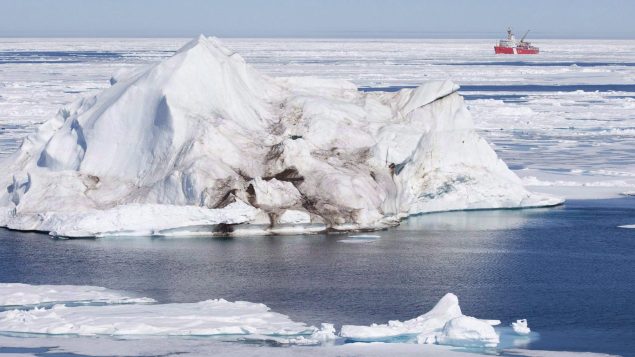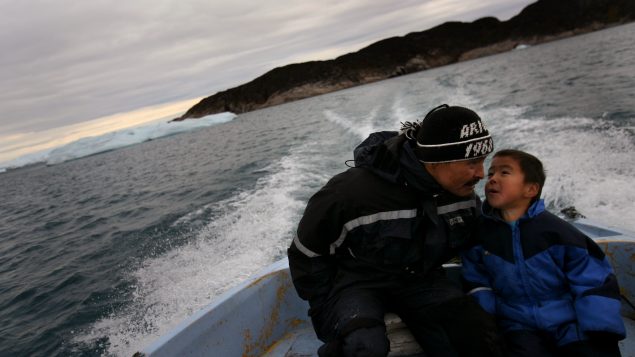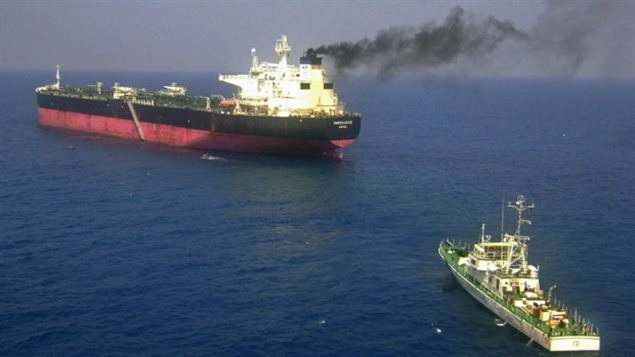Environmental and northern Indigenous communities are welcoming the decision by Greenland to push for a ban on the use of the highly polluting heavy fuel oil (HFO) in Arctic shipping.
In a statement released Monday, the government of Greenland (Naalakkersuisut) said it has agreed to actively work for a ban on HFO in the Arctic, at the United Nations International Maritime Organization (IMO).
“The prohibition must cover both navigation and transport of HFO in the Arctic,” the statement said.
The use of HFOs is already banned in the Antarctic. Several environmental and Indigenous groups have been campaigning for a similar ban in the Arctic.
In April, during the IMO’s Marine Environment Protection Committee (MEPC72) meeting, members states of the UN specialized agency agreed to develop plans to ban HFO, also known as bunker oil, from Arctic shipping, along with an assessment of the impacts of such a ban on Arctic communities.
‘Significant step’

An iceberg floating in the Baffin Bay above the arctic circle dwarfs the Canadian Coast Guard icebreaker Louis S. St-Laurent Thursday, July 10, 2008.
Heavy fuel oil (HFO), also known as bunker oil, is considered the cheapest and dirtiest type of fuel used in maritime shipping – and many say its use in the Arctic threatens the environment and Inuit livelihoods.
(Jonathan Hayward/THE CANADIAN PRESS)
Andrew Dumbrille, a World Wildlife Fund – Canada specialist in sustainable shipping, said it is now not a question of ‘if’ but rather ‘when’ a ban on HFO should be put in place.
“With Greenland committing to an HFO ban in the Arctic, which includes both use and carriage for use, it means the global community has taken a significant step forward in eliminating the world’s most polluting and hazardous shipping fuel,” Dumbrille said.
“This commitment, ahead of the next round of negotiations at the IMO in late October on an HFO ban, clears the way for delegates to quickly implement a ban.”
Hjalmar Dahl, president of Inuit Circumpolar Council Greenland, welcomed the announcement as “an important and right decision” for the protection of the Arctic marine environment from pollution.
“It completely falls in line with goals we have at ICC, especially how the Arctic as whole should be used and in the future,” Dahl said. “These pollution sources cause irreparable damage, which at the same time destroys our efforts to ensure our food security, and which in the long run harms the Arctic ecosystem.”
Rival proposals
The MPEC72 proposal to ban HFO as shipping fuel from Arctic waters — which would be mandatory for all ships operating under the International Convention for Prevention of Pollution from Ships (MARPOL) — was co-sponsored by Finland, Germany, Iceland, Netherlands, New Zealand, Norway, Sweden and United States.
- Inuit activist blasts Canada’s foot-dragging on dirty fuels ban in the Arctic
- International maritime body adopts Canadian proposal on heavy fuel oil in Arctic waters
While agreeing that “the threat of an accidental oil spill in Arctic waters remains the most significant threat from ships to the Arctic marine environment,” Canada, on the other hand, had urged the IMO to consider “economic and other impacts to Arctic communities associated with the restriction or phase-out of heavy fuel in Arctic waters.”
$1.2-million price tag for Greenland

Arne Lange, a Greenlandic fisherman and his son Angut Rosbach hunting seals near Ilimanaq, a village in Greenland. (Uriel Sinai/Getty Images)
Greenland has done the impact assessment and concluded that transitioning to cleaner and safer shipping is possible and important, Dumbrille said.
The government’s analysis shows that a ban on HFO in shipping will be associated with a socioeconomic cost for Greenland of approximately 8.1 million kroner (€1.085 million/ USD$1.268 million) annually.
Sian Prior, Clean Arctic Alliance Lead Advisor, said that with the upcoming MEPC73 meeting in London, Greenland’s backing of an HFO ban in the Arctic will encourage IMO member states to strengthen their commitment to quickly end the use and carriage of heavy fuel oil in Arctic waters.
“The best thing IMO member states can now do for their domestic shipping industries is to send a clear signal for investment in alternatives to HFO,” she said in a statement.
“We’re also calling on shipping companies crossing the Arctic – such as Maersk and COSCO – to show industry leadership and move towards cleaner fuels, and to commit to decarbonised forms of propulsion in the future.”
Dirty and cheap
Heavy fuel oil is the cheapest and the dirtiest marine fuel, accounting for 80 per cent of all fuels used in maritime shipping, according to a report by the International Council on Clean Transportation (ICCT).
Heavy fuel oil – a thick viscous residual fuel that produces high amounts of soot, particulate matter and black carbon – was also the most consumed marine fuel in the Arctic in 2015, the report said.
Although only 42 per cent of ships in the Arctic waters covered by the IMO’s Polar Code operated on HFO in 2015, these ships accounted for 76 per cent of fuel carried and 56 per cent of fuel transported in this region, the ICCT report said.
In addition to its toxicity, HFO is extremely viscous and breaks down more slowly in the marine environment than other fuels, particularly in colder regions like the Arctic, according to IMO documents.







For reasons beyond our control, and for an undetermined period of time, our comment section is now closed. However, our social networks remain open to your contributions.